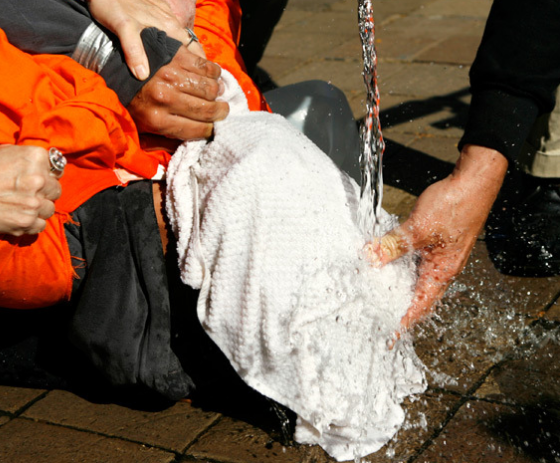These days, it looks like few Americans have faith in the Government. Various political scandals, often of a rather sinister nature, reach the ears of the media more often than before. Yesterday, the Senate Intelligence Committee released a 525-page summary of a 6,000+ page review of the CIA’s “enhanced interrogation” program. I recently came across an article that discusses some of the takeaways from the report.
In the report, Sen. Dianne Feinstein writes that the CIA detainees were tortured, and a lot of big names, including President Obama and Sen. McCain, seem to agree with them. In defense of their program, the CIA stated that their interrogation practices “saved lives”, which the Senate committee refutes in its report.
The report debunks the 20 top examples that the CIA had used to defend their enhanced interrogation program, claiming that each example as found to be wrong in “fundamental respects”. In addition, false confessions and fabricated information led the CIA to pursue red herrings, which failed to help in their fight against al-Qaeda. Nonetheless, the CIA pushed back against the report, saying that the information they obtained was able to “substantially advance” their strategic and tactical understanding of the enemy.
To this day, the CIA claims that their coercive interrogations were crucial to capturing bin Laden, although the Senate report concludes that the most accurate information the CIA obtained came from a detainee before they were even tortured. The Senate report insists that bin Laden could have been captured without torturing any detainees, and most accurate CIA intelligence that led to bin Laden’s capture came from Hassan Ghul. While Ghul was later subject to enhanced interrogations, the Senate report claims that Ghul provided the information that led to bin Laden’s courier through traditional interrogation before he ever faced any sort of torture.
To wear down detainees, the CIA implemented sleep deprivation, keeping them awake for up to 180 hours. Other tactics included keeping detainees in pitch-black rooms with excessive loud music. And these rooms were freezing cold. One detainee, who had been chained to a concrete floor, died of hypothermia. The official in charge of the investigation was a junior officer, who had no previous experience or training in handling prisoners. Others were later found to experience hallucinations, paranoia, insomnia and suicidal tendencies. When it came to interrogations, medical personnel were sidelined and their concerns ignored.
Before April 2006, President Bush wasn’t briefed on the specific CIA-enhanced interrogation techniques, meaning that it took four years from the time the program began until the President had a full accounting of CIA interrogations. Even then, however, the CIA provided huge amount of inaccurate and/or incomplete information. CIA officials either misstated or overplayed the success of the program when briefing White House officials. Junior officers were tasked with the oversight of detention facilities and untrained CIA officers interrogated detainees unsupervised. At least 17 detainees faced enhanced interrogations without even receiving a green light from CIA headquarters.
Khalid Sheikh Mohammed, the mastermind behind the 9/11 attacks, was waterboarded at least 183 times, with the CIA stating that this method was effective in helping interrogators pull information from him. However, interrogators themselves painted an entirely different picture, saying that Mohammed had figured out a way to beat the system of waterboarding, and was shown to respond better to non-confrontational approaches. Mohammed often recanted information he told CIA officers, just to get them to stop the waterboarding.
In 2005, two psychologists who helped develop the CIA’s enhanced interrogation procedures founded a company to help run the interrogation program, which pulled about $81 million from the government between 2005 and 2009. These psychologists were previously involved in the Air Force’s survival, evasion, resistance and escape school, with neither specialized knowledge of al-Qaeda, a background in counterterrorism or any relevant “cultural or linguistic” expertise.
